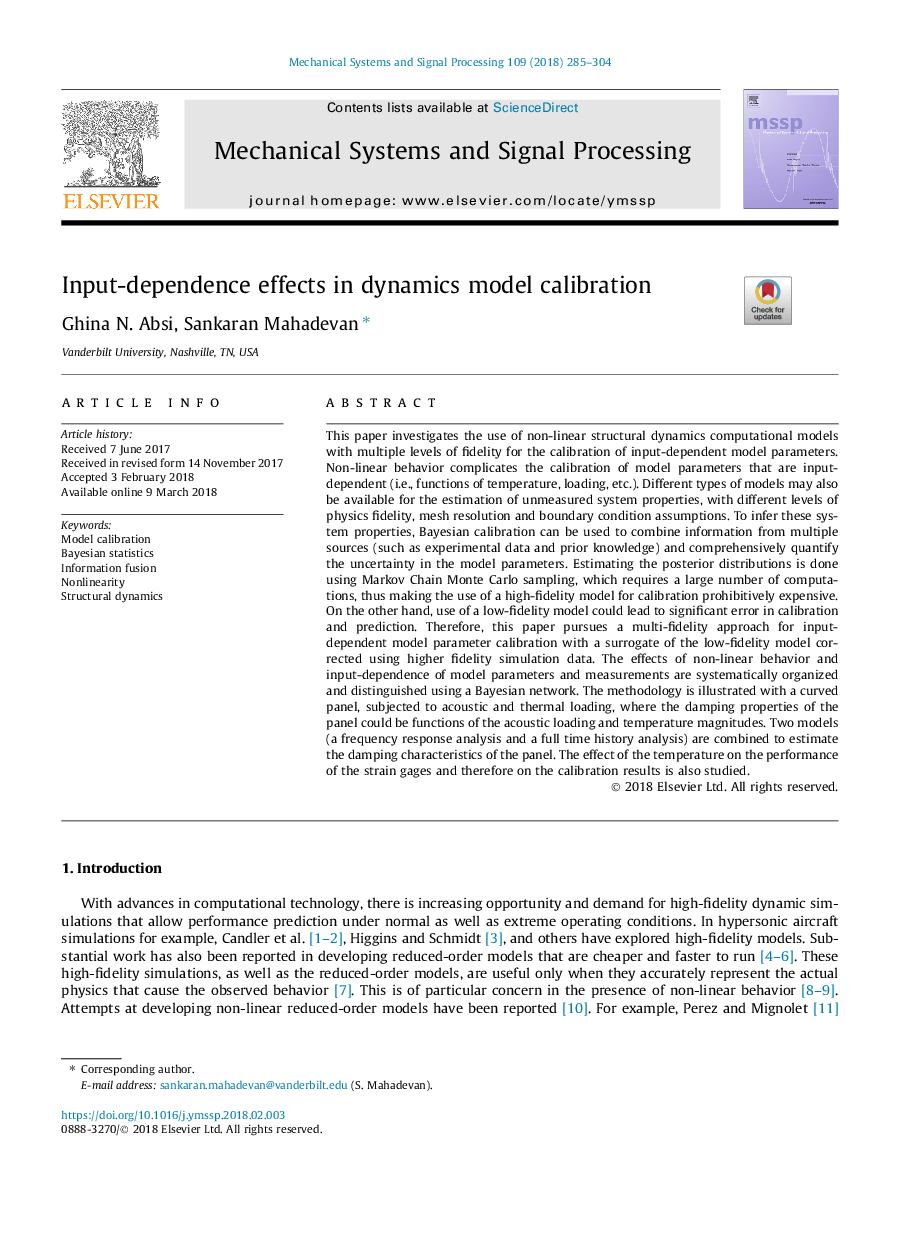| کد مقاله | کد نشریه | سال انتشار | مقاله انگلیسی | نسخه تمام متن |
|---|---|---|---|---|
| 6954117 | 1451826 | 2018 | 20 صفحه PDF | دانلود رایگان |
عنوان انگلیسی مقاله ISI
Input-dependence effects in dynamics model calibration
ترجمه فارسی عنوان
اثرات وابستگی ورودی در کالیبراسیون مدل پویا
دانلود مقاله + سفارش ترجمه
دانلود مقاله ISI انگلیسی
رایگان برای ایرانیان
کلمات کلیدی
کالیبراسیون مدل، آمار بیزی، تلفیق اطلاعات، غیر خطی، دینامیک ساختاری،
ترجمه چکیده
در این مقاله با استفاده از مدل های محاسباتی دینامیکی غیر خطی ساختاری با سطوح مختلف وفاداری برای کالیبراسیون پارامترهای وابسته به ورودی، بررسی شده است. رفتار غیر خطی کالیبراسیون پارامترهای مدل که وابسته به ورودی (یعنی عملکرد توابع دما، بارگیری و غیره) است، پیچیده می شود. انواع مختلف مدل ها ممکن است برای برآورد خواص سیستم های غیر اندازه گیری، با سطوح مختلف وفاداری فیزیکی، وضوح مش و فرض های مرزی شرایط موجود باشد. برای به دست آوردن این ویژگی های سیستم، کالیبراسیون بایس می تواند مورد استفاده قرار گیرد برای ترکیب اطلاعات از منابع مختلف (مانند داده های تجربی و دانش قبلی) و جامع بودن عدم قطعیت در پارامترهای مدل را تعیین می کند. برآورد توزیع خلفی با استفاده از نمونه برداری از مونت کارلو زنجیره مارکوف انجام می شود که به تعداد زیادی از محاسبات نیاز دارد، بنابراین استفاده از یک مدل با وفاداری بالا برای کالیبراسیون بسیار گران است. از سوی دیگر، استفاده از یک مدل کم اعتبار میتواند خطای قابل توجهی در کالیبراسیون و پیشبینی منجر شود. بنابراین، در این مقاله رویکرد چند وفاداری برای کالیبراسیون پارامتر مدل وابسته به ورودی با یک جایگزین مدل کم وفاداری اصلاح شده با استفاده از داده های شبیه سازی وفاداری بالاتر، دنبال می شود. اثرات رفتار غیر خطی و وابستگی به ورودی پارامترهای مدل و اندازه گیری به طور سیستماتیک سازماندهی شده و با استفاده از یک شبکه بیزی مشخص می شود. این روش با یک پانل منحنی، تحت بارگذاری صوتی و حرارتی قرار گرفته است که در آن ویژگی های دمایی پانل می تواند توابع بارگذاری صوتی و درجه حرارت باشد. دو مدل (تجزیه و تحلیل پاسخ فرکانس و تجزیه و تحلیل تاریخچه تمام وقت) برای تخمین ویژگی های دمایی پانل ترکیب شده است. اثر دما بر عملکرد گجت های فشار و به همین ترتیب نتایج کالیبراسیون نیز مورد بررسی قرار گرفته است.
موضوعات مرتبط
مهندسی و علوم پایه
مهندسی کامپیوتر
پردازش سیگنال
چکیده انگلیسی
This paper investigates the use of non-linear structural dynamics computational models with multiple levels of fidelity for the calibration of input-dependent model parameters. Non-linear behavior complicates the calibration of model parameters that are input-dependent (i.e., functions of temperature, loading, etc.). Different types of models may also be available for the estimation of unmeasured system properties, with different levels of physics fidelity, mesh resolution and boundary condition assumptions. To infer these system properties, Bayesian calibration can be used to combine information from multiple sources (such as experimental data and prior knowledge) and comprehensively quantify the uncertainty in the model parameters. Estimating the posterior distributions is done using Markov Chain Monte Carlo sampling, which requires a large number of computations, thus making the use of a high-fidelity model for calibration prohibitively expensive. On the other hand, use of a low-fidelity model could lead to significant error in calibration and prediction. Therefore, this paper pursues a multi-fidelity approach for input-dependent model parameter calibration with a surrogate of the low-fidelity model corrected using higher fidelity simulation data. The effects of non-linear behavior and input-dependence of model parameters and measurements are systematically organized and distinguished using a Bayesian network. The methodology is illustrated with a curved panel, subjected to acoustic and thermal loading, where the damping properties of the panel could be functions of the acoustic loading and temperature magnitudes. Two models (a frequency response analysis and a full time history analysis) are combined to estimate the damping characteristics of the panel. The effect of the temperature on the performance of the strain gages and therefore on the calibration results is also studied.
ناشر
Database: Elsevier - ScienceDirect (ساینس دایرکت)
Journal: Mechanical Systems and Signal Processing - Volume 109, 1 September 2018, Pages 285-304
Journal: Mechanical Systems and Signal Processing - Volume 109, 1 September 2018, Pages 285-304
نویسندگان
Ghina N. Absi, Sankaran Mahadevan,
